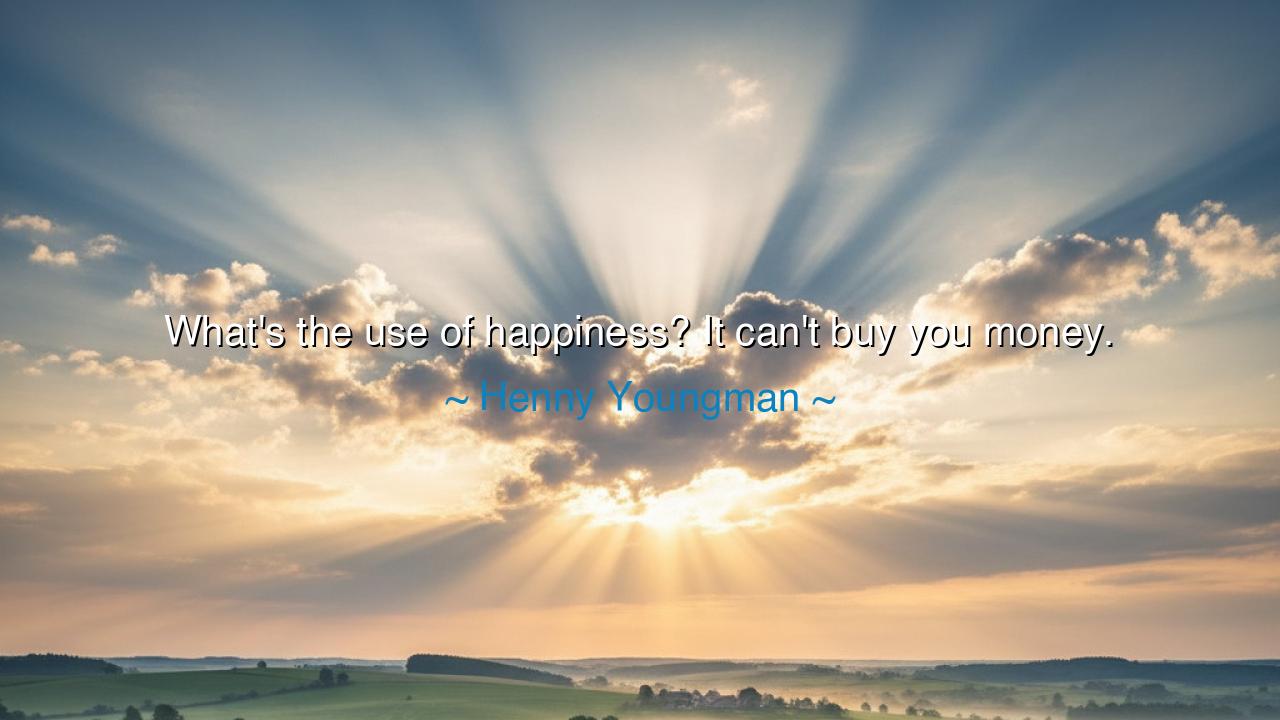
What's the use of happiness? It can't buy you money.






“What’s the use of happiness? It can’t buy you money.” So jested Henny Youngman, the master of one-liners, whose humor cut through the vanity of human desire like a blade wrapped in laughter. At first hearing, the words seem light—a comic twist upon the old saying that money can’t buy happiness. Yet within this jest lies a mirror, polished by wit, reflecting the strange dance between joy and wealth, between the heart’s delight and the world’s currency. What seems mere comedy conceals a question as old as civilization itself: what is truly of value to the human soul?
In the ancient way of wisdom, jesters were not fools, but teachers cloaked in mirth. Their words pierced pride without offense, and in laughter, they revealed the folly of kings. So it is with Youngman’s saying. He turns the familiar proverb on its head to remind us that humans are forever torn between the pursuit of happiness and the pursuit of money—each believing the other will bring completion. The humor lies not only in the inversion, but in the truth it exposes: that society so worships gold that even happiness must justify itself by its ability to yield profit.
Imagine, then, the tale of Howard Hughes, the mighty tycoon whose empire spanned air and earth. He possessed more money than most men could dream, yet his days ended in shadow and silence. Fear and loneliness consumed him; no treasure could purchase rest for his spirit. He could buy kingdoms, but not peace. And so Youngman’s jest becomes bitter truth: when money reigns supreme, happiness becomes its servant—mocked, diminished, and traded away for fleeting gain. The world, drunk on commerce, forgets that happiness is not for sale, nor can it be bartered for power.
Yet the saying may also be read with a wink of irony. For Youngman, a man who rose from hardship through the gift of laughter, understood that happiness itself is a form of wealth—one that cannot be exchanged in markets but enriches life beyond measure. When he quipped that happiness cannot buy money, he might have been mocking the absurdity of those who value money above joy. What good, he seems to say, is wealth if you cannot laugh, love, or live with lightness in your heart?
Throughout the ages, sages have wrestled with this paradox. The philosopher Diogenes, who lived in a barrel and owned almost nothing, once told Alexander the Great to “stand out of my sunlight.” In his simplicity, he was richer in happiness than any emperor. For though he had no money, he possessed the freedom of the soul—the truest form of abundance. His contentment was not purchased, but cultivated; not earned, but understood. So too must we learn that happiness, when pure, needs no gold to justify its worth.
To walk this path requires discernment. The world teaches that money is power, and power is everything. But the wise know that happiness is strength—the quiet fire that sustains one through poverty and loss. Seek not to “buy” joy, for such trade is folly. Rather, let happiness grow from gratitude, from simple acts of kindness, from the serenity of a clear conscience. These are coins that never tarnish and never lose their value.
Thus, the lesson of Youngman’s jest, though wrapped in humor, is no small one: do not mistake wealth for worth. Laugh at the vanity of those who chase gold while their hearts grow hollow. Build your treasure in the unseen realm—in friendship, in laughter, in the art of being content. For while happiness cannot buy money, it can purchase something far greater: the unbreakable joy of a life well-lived. And that, my friend, is a fortune no empire can ever steal.






AAdministratorAdministrator
Welcome, honored guests. Please leave a comment, we will respond soon